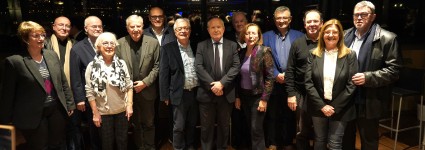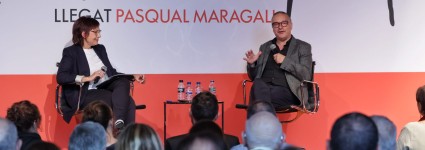Societies are increasingly intercultural, the movements of people are frequent and the reasons are various. These movements result in diverse and heterogeneous cities that pose a major political challenge. "For an intercultural future" is the third challenge of the Re-City Project, of the Catalunya Europa Foundation, which began after dealing with the challenges "Fighting inequalities" and "Facing climate change."
The cycle began with the conference, "Immigration Policies: Challenges, Goals and Instruments from a Comparative Perspective," by Nando Sigona, a professor at the University of Birmingham, an expert on migration policies. This conference addressed the question of migration policies through two neighboring cases, the crisis of refugees at the gates of Europe and Brexit.
To begin with, the coordinator of the cycle, Gemma Pinyol-Jiménez, stressed the importance of raising the right questions to rethink the governance of cities. And precisely with questions the conference Nando Sigona began, that raised the question of how we can define the integration and with which indicators we can measure it. And beyond the measuring instruments, who needs to be integrated? What makes a society integrative or integrative?
The process of integration, according to Sigona, is a dynamic and relational process that is based on the exchange and social dialogue and not on the assimilation of the "other". In this context, the narratives are very important, it is not the same talk of "refugees" that talk about "immigrants." This change of denomination, which coincided with an increase in the arrival of migrants in Europe, reflects a racialization of hierarchies among people that conditions, among others, the response that is given to the deaths of migrants in the Mediterranean .
Today, the migratory crisis has gone down in the background, but that does not mean it has ceased to exist. In 2018, 89% of migrants came to Europe less than in 2018, but the data is a mirage, migratory movements continue to produce, although the EU has managed to curb arrivals through agreements with countries Third parties, which makes it difficult to obtain data. And those who arrive? Often migration policies are completed at the time of rescue, without taking into account subsequent integration policies.
A very different case, but also with an affect on migration policies was Brexit. Sigona claims that, from a British perspective, the European project was only understood as an economic opportunity, without taking into account other political or identity aspects. The politician, who has studied cases of European residents in the United Kingdom in particular, states that between 2007 and 2018 requests for British nationalization from European Union nationals went from 4 to 28%. This is because some of the nationals of the recently incorporated countries in the EU felt their stability was more threatened, and therefore tended to seek nationalization rather than nationals from other European countries, such as Germans or Italians. Therefore, the myth that integration takes place at the time of naturalization is called into question when the desire to become nationalized derives more from the fear of being part of a community.










